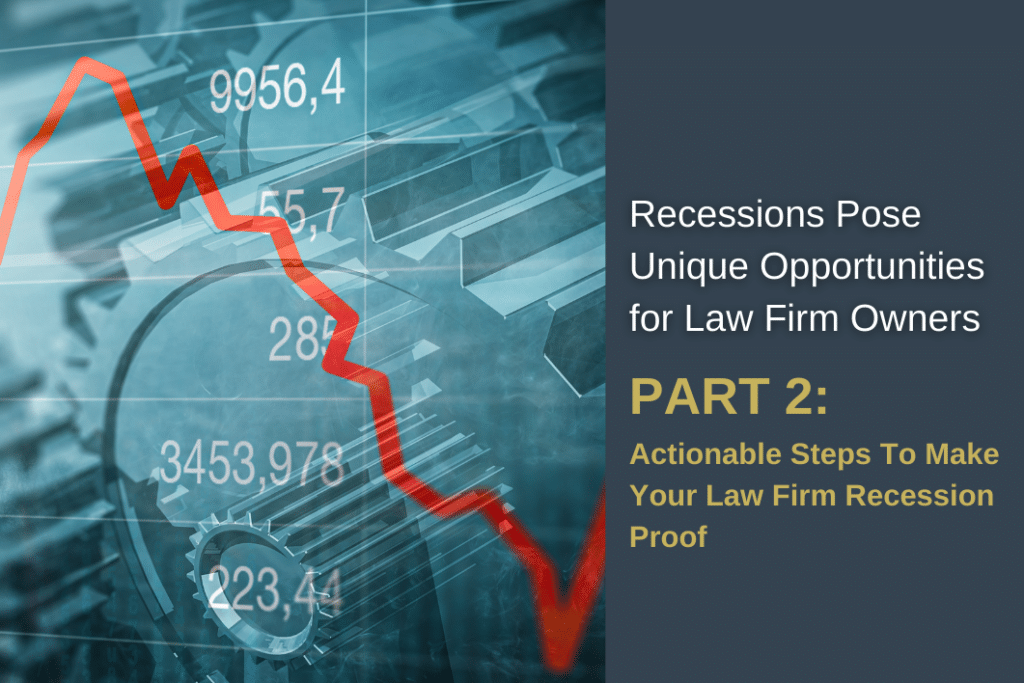As we’ve discussed, a recession is likely on the horizon (Part 1). Interest rates have risen and are holding steady as the Federal Reserve tries to slow inflation and stabilize the economy.
Law firms are no different from other businesses. We face the same economic boom and bust cycles as our clients. However, lawyers and law firms have never been accused of sitting on the vanguard of business and management skills.
Scary as they may seem, recessions are not all downside. They serve a critical role in regulating a market economy. They can also be an opportunity for law firms that are ready to capitalize on the moment. Savvy and entrepreneurial law firms can seize upon these opportunities to grow their market share, cut their costs and maintain (or even grow) their profit margins while their competition is scared, stagnant, and contracting.
Even though recessions pose an opportunity for the strong, nimble and entrepreneurial, most firms will struggle. Each of us know lawyers who have closed their own firms, or have been displaced because their law firms failed around them. And it’s hard to forget the likes of Dewey, Howrey, Bingham McCutchen, and Heller Ehrman, all of which failed in dramatic fashion.
It’s both normal and easy to doubt yourself: “If it can happen to them, why can’t it happen to me”? And the simple answer is, it can, if you’re not prepared.
Here are some actionable steps you can begin to make your law firm business recession proof, so that you can see the economic downturn as an opportunity.
1 – Evaluate Your Firm’s Working Capital
It’s business 101, but you need to prepare your plan before you need it. The easiest way to thrive in a recession is to enter from a position of strength. And that includes financial strength.
I’ve been a corporate bankruptcy lawyer for more than 25 years and I’m about to enter my 5th economic downturn. I have advised businesses of all sizes, including multiple law firms, on how to survive and thrive both in and out of recessions. I’ve also seen a lot of successful and not so successful business models when it comes to debt and working capital.
As lawyers, we spend too little time evaluating our own businesses. And there are fundamental questions that every business needs to ask itself in this environment:
- Do I have high interest revolving debt?
- (Am I overpaying low interest loans?
- Do I have a line of credit or cash reserves sufficient to cover 90 days of operating expenses?
The first place to look is your debt structure. In an environment of rising interest rates, evaluate whether you are managing your capital efficiently. Have you placed firm expenses on your credit cards, are you overpaying your low interest student loans or do you have revolving debt that matures soon? In a recession, capital can be the key to survival.
A good rule of thumb is to have cash reserves sufficient to cover three months of operating expenses for your firm (and your household). It’s certainly true that not every firm will have the luxury or flexibility of having this type of capital in the bank, and thus, now is the time to get a line of credit. As the old adage goes, when you need the loan it’s much harder to get. Now is the time to secure a line of credit when your balance sheet and financial statement probably look their strongest, and while interest rates are rising, banks have yet to meaningfully tighten lending criteria (although it’s happening).
2 – Evaluate Your Firm’s Expenses
I’m a strong believer that law firms can’t save their way to profitability. Having said that, law firms usually have unnecessary and wasteful expenses which need to be managed. It’s the nature of business. Costs tend to rise over time, and we as lawyers are not professional managers.
The outcome is expense creep. A subscription here, a reoccurring expense there, it adds up in an amount that won’t fundamentally change your firm’s financial prospects. However, it’s just good sense to look at your cost structure and cut the things that aren’t necessary.
Want some ideas on areas of overhead that can be trimmed? Read more here and here.
3 – Evaluate Your Team
Of all the things you have to do, there’s nothing harder than evaluating the people who comprise your team. You may spend more time with them than you do your own family, and you care greatly about them. However, whether you care about them is not the test.
Unfortunately, the test is the financial health and long-term viability of your law firm and whether they are a benefit or a burden to the business. Compassion and caring, while the most noble of qualities, neither pays the rent nor offsets the potential slowdown of your practice.
As uncomfortable and distasteful as the idea may sound, you must be focused in your efforts and dedication to protect the firm as a whole. The best advice I can give is to cut faster, deeper and harder than your instincts tell you. And then cut more.
Do you have an out of favor attorney or practice group that has, or is likely, to become a burden upon the firm? Can you afford to put the entire firm at risk simply because you don’t want to face the reality that a valued member of your firm is no longer pulling their own weight, even if it’s through no fault of their own?
Our team at LAWCLERK wants to see you hire for success at your law firm. Part of this strategy is to encourage you to consider the reality that your future law firm will likely be staffed much differently than the law firm where you started out as a young associate. When it comes to managing overhead and staying nimble during economic downturns, this is a good thing.
Be sure to subscribe to our blog so you don’t miss the next installment in this series. Or if you’d like to learn more on this topic you can download a copy of our Recession Proofing Your Law Firm Guide.



















